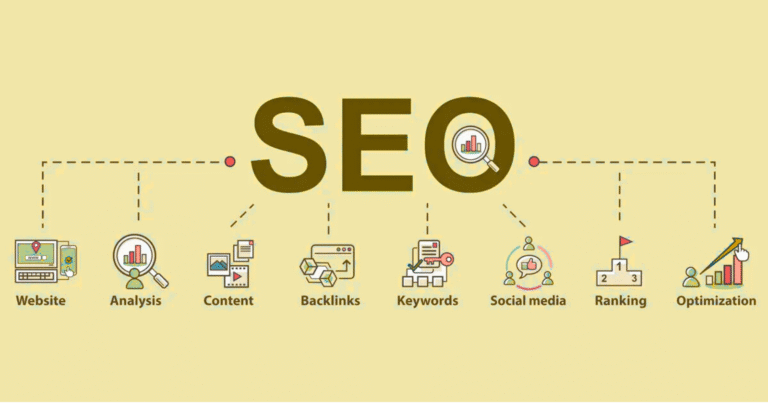If you’re asking, “How can I increase my SEO?” — you’re already on the right path. Search Engine Optimization isn’t just a buzzword; it’s the backbone of online visibility.
But here’s the truth: SEO isn’t about tricking Google. It’s about creating the kind of content and experience that Google — and your audience — can trust.
In this guide, we’ll walk through the most effective, realistic ways to improve your SEO step-by-step. No fluff, no shortcuts — just what works.
What Does It Mean to “Increase SEO”?
To “increase SEO” means improving the elements that affect how your website ranks on search engines like Google. When you increase your SEO, you:
- Rank higher for relevant keywords
- Attract more organic traffic
- Reach people who are actively searching for what you offer
It’s about making your website more useful, discoverable, and trustworthy — both to search engines and real people.
1. Start with the Right Keywords
Before you write anything or update your site, understand what your audience is searching for.
How to Find Good Keywords:
- Use tools like Google Keyword Planner, Ubersuggest, or AnswerThePublic
- Choose keywords with medium search volume and low competition
- Focus on long-tail keywords (e.g., “how to increase SEO for a small business”)
Once you have a list, naturally integrate these keywords into your:
- Page titles
- Meta descriptions
- Content body
- Subheadings (H2s, H3s)
- Image alt tags
- URLs
Avoid keyword stuffing. Write for people first, and include keywords where they make sense.
2. Optimize Your Content (On-Page SEO)
Your content needs to be clear, helpful, and structured for both users and search engines. That’s where on-page SEO comes in.
Key On-Page SEO Elements:
- Title Tag: Clear and includes your main keyword
- Meta Description: Enticing summary under 160 characters
- Headings: Use H1, H2, and H3 tags for structure
- Content: Aim for depth, clarity, and usefulness
- Internal Links: Link to other related content on your site
- External Links: Link to credible sources when needed
- Images: Use descriptive file names and alt text
Google favors content that is original, well-organized, and helpful. Add real examples, FAQs, or lists to improve user engagement.
3. Improve Site Speed
Site speed is a ranking factor. If your site is slow, people leave — and Google notices.
Tips to Increase Speed:
- Compress your images before uploading
- Use lightweight WordPress themes (like Astra or GeneratePress)
- Minimize plugins
- Enable browser caching and lazy loading
- Use a CDN (Content Delivery Network)
You can test your speed with Google PageSpeed Insights or GTmetrix.
4. Make Your Site Mobile-Friendly
Over 60% of searches now happen on mobile. Google uses mobile-first indexing, meaning your mobile version is the primary version for ranking.
Best Practices:
- Use a responsive design
- Avoid pop-ups that block content
- Keep fonts readable and buttons tap-friendly
- Test with Google’s Mobile-Friendly Tool
5. Create High-Quality Content Consistently
Publishing helpful content regularly signals to Google that your website is active and valuable.
What Makes Content High-Quality?
- It solves a specific problem
- It’s easy to read (short paragraphs, subheadings)
- It’s original and insightful
- It uses media (images, videos, infographics)
- It encourages engagement (comments, shares, time on page)
Focus on evergreen topics — content that stays relevant over time, like:
- How-to guides
- Step-by-step tutorials
- Product reviews
- Beginner’s guides
6. Build Backlinks from Trusted Sources
A backlink is when another website links to yours. It acts like a vote of confidence, and Google takes these seriously.
Ways to Get Backlinks:
- Guest posting on reputable blogs
- Creating shareable content (stats, case studies, infographics)
- Submitting your site to niche directories
- Reaching out to bloggers and journalists in your industry
- Answering questions on Quora or Reddit with a link to your content
Quality matters more than quantity. A few good backlinks from respected sites are better than dozens of spammy ones.
7. Use Google Search Console and Analytics
If you’re not tracking your SEO, you’re just guessing.
Google Search Console helps you:
- Monitor keyword rankings
- Submit sitemaps
- Identify crawl errors
- Track click-through rates (CTR)
Google Analytics helps you:
- Understand user behavior
- Track page views, bounce rate, and time on page
- See which pages perform best
Use the data to find what’s working — and improve what’s not.
8. Optimize for User Experience (UX)
SEO isn’t just technical — it’s about people. If users enjoy your site, stay longer, and engage more, your rankings will improve.
Improve UX by:
- Making navigation easy and intuitive
- Using clean, professional design
- Writing clear headlines and CTAs (calls to action)
- Breaking up long text with visuals and bullet points
- Removing distractions and clutter
A better experience = longer sessions = better SEO.
9. Update Old Content
Old content may still get traffic — but only if it stays relevant. Google favors fresh, accurate information.
How to Update:
- Add recent stats or new insights
- Fix outdated links or tools
- Improve formatting for readability
- Update keywords if needed
- Re-share it on social media or email
Regular updates keep your content competitive.
10. Avoid Black-Hat SEO Tactics
Never try to trick Google. Techniques like buying backlinks, hiding text, or stuffing keywords can lead to penalties or lower rankings.
Stick to white-hat SEO: strategies that are ethical, user-focused, and aligned with Google’s guidelines.
Final Thoughts: SEO is a Long-Term Game
There’s no magic switch to boost SEO overnight — but consistent, smart actions will move you up in search rankings over time.
Start with:
- Understanding your audience
- Writing content that helps them
- Making your site technically sound
- Building authority naturally
Whether your goal is traffic, sales, or AdSense approval, SEO is the foundation. Invest in it with patience, and you’ll see the payoff.







